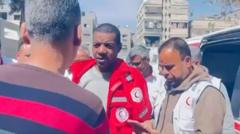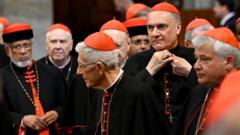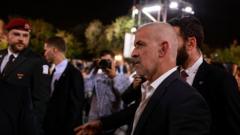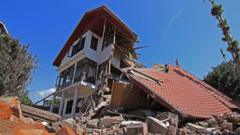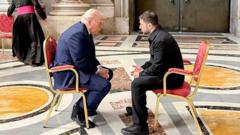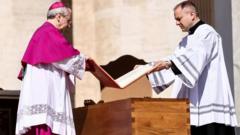Israeli officials' lackluster response to Pope Francis's death, including a deleted initial tribute and minimal funeral representation, underscores strained relations with the Vatican amid Gaza tensions.
Israel's Tepid Condolences for Pope Francis Reflect Tensions with the Vatican

Israel's Tepid Condolences for Pope Francis Reflect Tensions with the Vatican
Israeli Prime Minister's subdued reaction to the late pontiff highlights ongoing conflict over Gaza.
Prime Minister Benjamin Netanyahu's office has extended condolences for Pope Francis, four days after his passing, revealing the complexities surrounding Israel's diplomatic stance. The initial message posted on social media was retracted, stirring debate within Israel. Current representatives will attend his funeral in Rome, yet only the ambassador to the Vatican will go, contrasting with leaders from other nations.
The situation illustrates dissatisfaction with the Pope's outspoken support for the Palestinian people amid the war in Gaza. An official state statement issued late Thursday read: “The State of Israel expresses its deepest condolences to the Catholic Church and the Catholic community worldwide at the passing of Pope Francis. May he rest in peace.” This followed a warmer initial post featuring a photograph of the pontiff at the Western Wall, which was quickly deleted for unspecified reasons.
Reports indicate that the Jerusalem Post cited an "error" in the premature release of that message. The deletion was criticized by former diplomats, including Raphael Schutz, who labeled it a mistake. Notably, Israel's Vatican ambassador, Yaron Sideman, is scheduled to attend the funeral alone, diminishing Israel's representation at a high-profile event that will host many world leaders, including US President Donald Trump.
The current President of Israel, Isaac Herzog, did express heartfelt condolences shortly after the news of Pope Francis’s death, describing him as a man of deep faith and compassion. However, there are no indications that he will attend the funeral, potentially due to the timing coinciding with Shabbat, the Jewish Sabbath.
Pope Francis’s last public addresses were laden with references to the human suffering experienced by both Palestinians and Israelis during the ongoing conflict. In recent months, he urged the international community to consider whether Israel's actions in Gaza could be categorized as genocide, a claim vehemently denied by Israeli officials. His direct communications with the Christian community in Gaza also demonstrated his solidarity during troubled times.
The sentiments from Palestinian representatives, such as Prime Minister Mohammad Mustafa attending the funeral, showcase the Pope's influence and the breach formed between him and elements within Israel's current government. The absence of higher-level Israeli representation at the Pope's funeral may further accentuate the growing rift resulting from conflicting views over the humanitarian crisis in Gaza.

